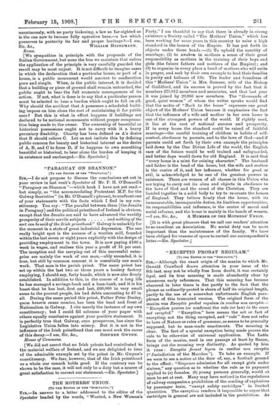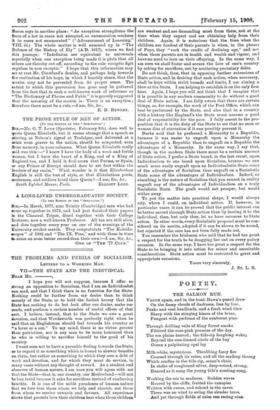" EXCEPTIO PROBAT REGULAM."
LTO VIII EDITOR OF Till "SPICTAT011."]
Snt,—Although the exact origin of the maxim to which Mr. Oswald Crawford draws attention in your issue of the 8th inst. may not be wholly free from doubt, it was certainly legal, and its true meaning is made abundantly clear by numerous early references. That this meaning has become obscured in later times is due partly to the fact that the phrase as ordinarily quoted is shorn of half its original length, partly to the use of a somewhat unfortunate English para- phrase of this truncated version. The original form of the maxim was Exceptio probat regulam in. casibus non exceptis- " Exception proves (or confirms) the rule (or law) in the cases not excepted." "Exception" here means the act or fact of excepting, not the thing excepted, and " rule " does not refer to laws of Nature or rules of grammar, as seems to be generally supposed, but to man-made enactments. The meaning --is clear. The fact of a special exception being made proves the rule to be otherwise of universal application. The Latin form of the maxim, used in one passage at least by Bacon, brings out the meaning very distinctly. As quoted by him it runs : Exceptio firniat legam in casibu.s non exceptis ("Jurisdiction of the Marches "). To take an example. If we were to see a notice at the door of, say, a football ground to the effect : "Sixpence admission for all except girls under sixteen," any question as to whether the rule as to payment applied to (a) females, (b) young persons generally, would at once be set at rest. Many may have noticed in the regulations of railway companies a prohibition of the sending of explosives by passenger train, "except safety cartridges" in limited quantities. The exception renders it impossible to argue that cartridges in general are not included in the prohibition. As
Bacon says in another place : "As exception strengthens the force of a law in cases not excepted, so enumeration weakens Rs in cases not enumerated" (" Advancement of Learning," Till. iii.) The whole matter is well summed up in "The Defence of the Bishop of Ely" (AD. 1617), where we find this passage: "Indefinites are equivalent to universals especially when one exception being made it is plain that all others are thereby cut off, according to the rule exceptio figit pegulam in non exceptis." I hope that this information may set at rest Mr. Crawfurd's doubts, and perhaps help towards the realisation of his hope, in which I heartily share, that the maxim may not be perverted from its proper sense. The extent to which this perversion has gone may be gathered from the fact that in such a well-known work of reference as " The Dictionary of Phrase and Fable" it is gravely suggested that the meaning of the maxim is : There is an exception ; therefore there must be a rule.—I am, Sir, &c., E. D. BEWLEY.





































 Previous page
Previous page